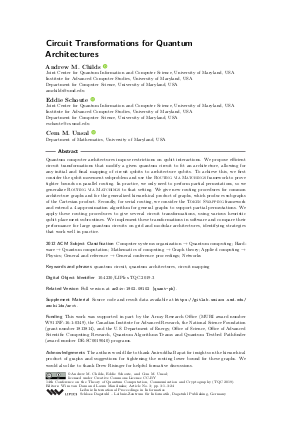@InProceedings{childs_et_al:LIPIcs.TQC.2019.3,
author = {Childs, Andrew M. and Schoute, Eddie and Unsal, Cem M.},
title = {{Circuit Transformations for Quantum Architectures}},
booktitle = {14th Conference on the Theory of Quantum Computation, Communication and Cryptography (TQC 2019)},
pages = {3:1--3:24},
series = {Leibniz International Proceedings in Informatics (LIPIcs)},
ISBN = {978-3-95977-112-2},
ISSN = {1868-8969},
year = {2019},
volume = {135},
editor = {van Dam, Wim and Man\v{c}inska, Laura},
publisher = {Schloss Dagstuhl -- Leibniz-Zentrum f{\"u}r Informatik},
address = {Dagstuhl, Germany},
URL = {https://drops.dagstuhl.de/entities/document/10.4230/LIPIcs.TQC.2019.3},
URN = {urn:nbn:de:0030-drops-103958},
doi = {10.4230/LIPIcs.TQC.2019.3},
annote = {Keywords: quantum circuit, quantum architectures, circuit mapping}
}

 Creative Commons Attribution 3.0 Unported license
Creative Commons Attribution 3.0 Unported license







